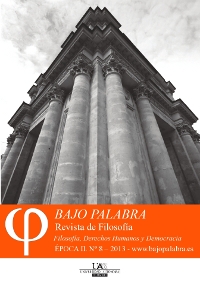I. Fundamentación y perspectivas filosóficas de los derechos humanos
Aequitas, the silent divinity: around the ambiguous reference of virtue in Kant's practical philosophy
Published
December 30, 2013
Keywords:
Kant, law, morality, equity, moral conscience, desire of the other
How to Cite
Vázquez-Romero, J. M. (2013). Aequitas, the silent divinity: around the ambiguous reference of virtue in Kant’s practical philosophy. Bajo Palabra, (8), 97–111. https://doi.org/10.15366/bp2013.8.005
Copyright (c) 2013 José Manuel Vázquez-Romero

This work is licensed under a Creative Commons Attribution 4.0 International License.
Abstract
This article reconstructs the genealogy of the moral law of Kant's practical philosophy relating it to the anomaly of the right to equality. Due to a lack of enforcement mechanisms, the right to equality is segregated from the scope of ius, which is the externality of duty transferred to the moral conscience, where it resonates as guilt that establishes subjectivity in the difference (homo noumenon / homo phaenomenon) of the subject.
